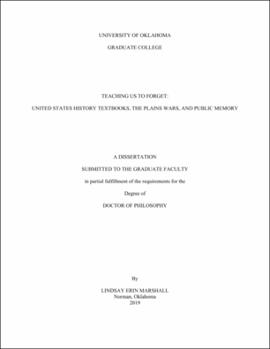| dc.contributor.advisor | Metcalf, Warren | |
| dc.contributor.author | Marshall, Lindsay | |
| dc.date.accessioned | 2019-06-13T23:44:50Z | |
| dc.date.available | 2019-06-13T23:44:50Z | |
| dc.date.issued | 2019-05-10 | |
| dc.identifier.uri | https://hdl.handle.net/11244/320347 | |
| dc.description.abstract | History education is the cornerstone of public memory construction in the United States, and it has the potential to facilitate the necessary process of reconciliation with our troubled past. And yet after a century of progress in both pedagogy and Native American history, our secondary U.S. history curriculum continues to reinforce settler colonial narratives of Native history. In Teaching Us to Forget: United States History Textbooks, the Plains Wars, and Public Memory, I contend that rather than mere artifacts of archaic thinking, secondary history textbooks are active distorters of U.S. history based on a romanticized frontier experience. Native history is the context in which U.S. history occurs, not a minor thread within it, but textbooks invert the narrative, alienating Native students and preventing all students from wrestling with the contradictory elements of American identity.
Despite decades of historical scholarship and history education reform, the narrative of the Plains Wars presented in U.S. history textbooks remains structurally unchanged from its first appearance in the late nineteenth century. This dissertation traces the formation of that narrative. Organized around the chronological construction of Plains Wars narratives in historiography and textbooks from the 1870s through the early 1980s, this dissertation analyzes the ways in which nineteenth century narratives of the Plains Wars and U.S. history textbook narratives shaped each other. U.S. history textbooks serve a powerful and largely unrecognized role in shaping public memory in the United States. Their Plains Wars narratives were contested throughout the nineteenth and twentieth century, and groups like Indian Wars veterans, Native rights organizations, educators’ organizations, and historical societies actively worked to frame them. This project seeks to better understand how this curricular marginalization of Native history reinforces white supremacy, closing avenues for students to reconcile with the past. | en_US |
| dc.language | en_US | en_US |
| dc.rights | Attribution-NonCommercial-NoDerivatives 4.0 International | * |
| dc.rights.uri | https://creativecommons.org/licenses/by-nc-nd/4.0/ | * |
| dc.subject | History, United States. | en_US |
| dc.subject | Education, History of. | en_US |
| dc.subject | Native American Studies. | en_US |
| dc.title | Teaching Us to Forget: United States History Textbooks, the Plains Wars, and Public Memory | en_US |
| dc.contributor.committeeMember | Shotton, Heather | |
| dc.contributor.committeeMember | Hyde, Anne | |
| dc.contributor.committeeMember | Keppel, Ben | |
| dc.contributor.committeeMember | Wrobel, David | |
| dc.date.manuscript | 2019-05-09 | |
| dc.thesis.degree | Ph.D. | en_US |
| ou.group | College of Arts and Sciences::Department of History | en_US |
| shareok.nativefileaccess | restricted | en_US |

